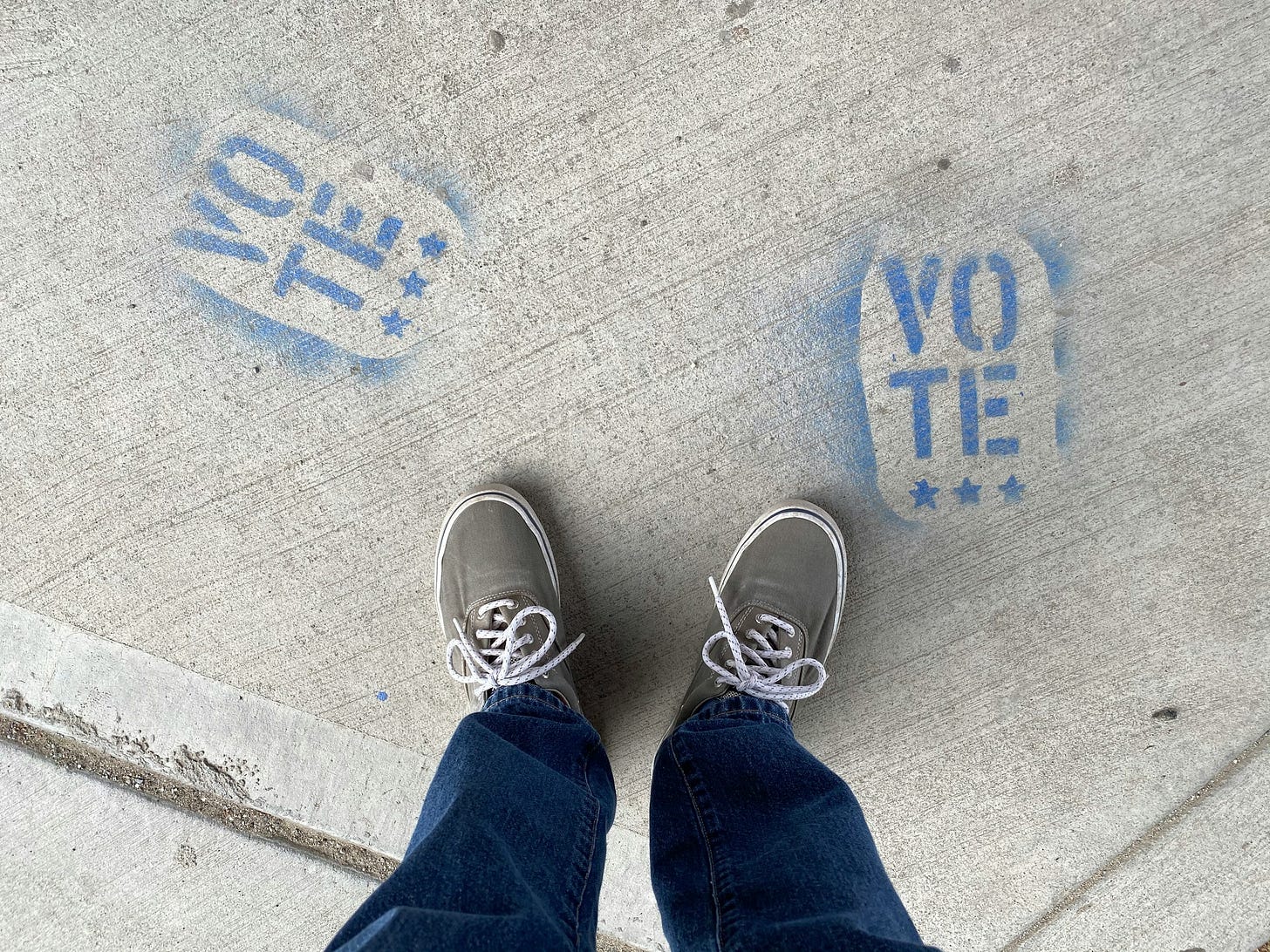Election Anxiety Is Real, So Make a Plan to Disengage
The best thing you can do for your mental health this year.
Hi everyone, this is a bit of an op-ed piece. Opinion pieces need to demonstrate a real opinion! So here it is.
If there’s one thing you can do for your mental health in 2024, it’s this: stop following political news. I mean this literally: STOP PAYING ATTENTION to polls, predictions, and pundits. None of these things make you “more informed” or otherwise do you any good. In fact, they are quite possibly making you anxious and stressed out—and it will only get worse as November draws closer.
Meanwhile, the political news industry thrives on conflict. It’s not going to stop, but you can.
You do not need a list of reasons why avoiding political news is a good decision. Just in case, though, I shall offer you a few.
Eight months out, it’s clear that many people already feel deep anxiety about the coming U.S. presidential election. All you need to do is watch (or read, or listen) to almost any news media to understand that THIS ELECTION—and all the drama that surrounds it—is the one topic that will consistently draw in views, clicks, or streams.
It’s as though every media outlet has borrowed the worst of reality TV and applied it to the daily news cycle.
Meanwhile, major book publishers have moved many of their titles out of “election season” pub date windows, because they fear there will be no room in the conversation for anything that isn’t about the election. Just to be clear, these are books that have nothing to do with politics. They aren’t books from some competing industry—they’re just, you know, other books on other topics.
I’m writing a book on Time Anxiety (coming next year) and told my editor recently I wished I’d come with up Election Anxiety as a book concept. Just kidding though, I don’t really want to write that book because it would be depressing.
Polls Are Worse than Useless
The nonstop media onslaught continues in the face of an essential truth: No one knows what will happen in November.
The polls will be right or they will be wrong—or more likely, the polls will be wrong, but the people who profit from publicizing them will claim to have been right all along, if only we had read the tea leaves closely enough. It wasn’t their fault!
Sure, okay.
The season of drama and angst that started in 2016 never really went away—and will it ever? How many years must something continue before we understand that this is how it’s going to be.
Again, it’s not going to stop, but we can.
That’s why I am dropping out of all political news and commentary, and I invite you to feel permission to do so as well. (You don’t need permission from me, of course. But many people feel compelled to follow news that makes them unhappy, and I want you to understand that you don’t have to do this.)
Following this kind of news is habit-forming and harmful. In the years to come we will look back and consider the contributors to poor health and addiction: tobacco giants, fast food companies, social media titans, the Sackler family (for example).
And now we can add to the list: the industrial complex of political news, polls, and commentary. Whatever one gains from it, it’s just not worth it.
Speaking of gains…
Who Benefits from Your Attention?
Maybe you think that keeping up with political news is part of being a good citizen. Fair enough—I’ve been there. Just consider one thing: “Who benefits from your attention?”
Asking “Who benefits?” is a good question to ask in many situations. When thinking about rules, for example, ask, who benefits from you following the rules? (Here’s a short video I made about this.)
So in the context of political news, we can ask, “Who benefits from you giving your attention to this endless drama?”
Hint: it’s not you!
The answer is that large corporations benefit. The owners of Meta, Fox News, CNN, “X,” and every other network and platform are the ones who benefit. In the 2020 election, over $14 billion was spent on advertising. Presumably this go-around will add up to an even higher number.
In addition to large corporations, a professional class of pundits benefits: the pollsters, the B-list politicos who go to become paid commentators, and a large number of hangers-on who orbit “the conversation” for their own enrichment.
Some of them work for campaigns, where they are employed to build better ways to harass you by text message, sending you urgent calls-to-action, begging for your $10 donation that will surely turn the tide. No one mentions that this money will mostly go to two sources: 1) more ads, and 2) compensation for campaign staffers, including the ones who make a living by asking you for money.
Getting Mad Is Dysregulating
All of this ecosystem, from the spam text messages to the polling industry, comes to us from at least two distinct sides, in addition to varying subgroups. But there is something that both sides clearly agree on:
Everything is urgent, and everything is a crisis.
When something is urgent, we are expected to stop and pay attention now. It doesn’t matter what else we were doing—crisis demands attention and nervous system response.
And again, who benefits from the urgent, non-stop state of crisis?
They do. Not you.
That’s why you can choose something different: to disengage. To opt-out as a form of protest, but also for your own wellbeing.
Getting mad every day is dysregulating. You don’t need to follow the back and forth, the play-by-play of the Supreme Court, the roving cabal of House Speakers, the latest and greatest indictments, the trials, the backlash to the backlash.
The number of podcasts about the election you listen to will not change the outcome. Responding to messages asking for $10 will only result in the campaign asking you for $100 next week.
So what should you do instead?
You can, instead, do better things.

Some Better Things We Can Do
Start with this:
Peace begins with yourself. Be a better person. Regulate your nervous system.
Cultivate your home life. Develop your inner world. Deepen your circle of true friends and real relationships.
And maybe:
Do good for others in a non-performative way.
Find some way to do good that no one else knows about—something secret to you that makes someone else’s life better. When you do this, you will walk around with a smile on your face for hours.
Then move to something like this:
Read actual history. Like, you know, books. Pick one thing to learn about and go deep. Or watch some free courses. You don’t even need to pay for Masterclass—platforms like Coursera and EdX give them away!
Or possibly:
Get involved locally. There’s probably a school board near you that wants to ban books or something. No doubt that will be infuriating too, but at least you’ll have a real chance of doing something about it. And, who knows, maybe you’ll meet your neighbors and discover that you don’t actually hate each other.
Or just avoid politics entirely, and focus on something of beauty. Are there beautiful things in your life right now? If not, maybe it would be good to cultivate some. I’d suggest houseplants, but mine are struggling right now—they’ve probably been watching the news while I’ve been traveling.
***
So as you can see, there are many alternatives—lots of good ways to spend your time and focus.
Just not by following political news. My suggestion, likely with your best interests in mind: unsubscribe, unfollow, walk away from all of it—at least as much as you can.
Comments are open, just be nice. And could we do it without mentioning any particular candidate/politician/party by name? :)
P.S. An update from AJ Jacobs, longtime friend and fellow author:
In my latest experiment, I tried to follow the Constitution by the original meaning from 1789. One thing I learned is that we need to evolve the meaning of the Constitution. But another thing is that there are some ways of life from the 18th century that were wise—INCLUDING the fact that they only got their news two times a week instead of 18 hours a day!
(AJ’s new book is called The Year of Living Constitutionally.)





I work in the political field and I see the mental distress daily. I think this is good advice. Everyone needs to do a mental inventory about how news and news about politics affects them. Politics has always been toxic and corrosive. People who live in this sewer like your local elected officials get ground down by all the hate and anger as well as all the temptations. It’s a crucible where human flaws are magnified x10. That’s on the wholesale side. Most of us are on the retail side. We are consumers. So we can have a choice about what we consume.
Hey, just a follow up to your "get involved locally" idea: I found a way to actually look forward to elections. I volunteer as a poll worker. It's very intense work, but also calm -- there's a system, and the system works surprisingly well. I also get to meet people who are my neighbors, regardless of whether I am aligned with them on the political spectrum, and we're polite and matter of fact (most of the time).
I realize that not all polling places are like that -- Florida? Arizona's Maricopa County? Not sure I'd recommend it. And I've had one or two times when registration frustrations by the voter were taken out on me. But for the most part, it has completely changed elections for me.